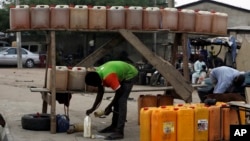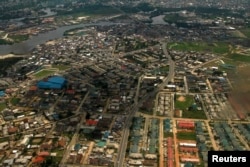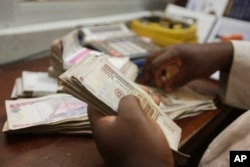Nigeria’s central bank governors are meeting amid a gloomy financial outlook for Africa’s largest economy. Numbers released last week show the country's economy contracting. Economists blame a shortage of fuel, persistent power outages and a fall in the production of Nigeria’s top moneymaker, oil.
Nigeria is heading for a recession.
That’s what analysts say after the National Bureau of Statistics announced the economy contracted by about four-tenths of a percent in the first quarter of this year.
Africa economist at London-based Capital Economics John Asbhourne said a shortage of fuel and shortage of dollars to pay for imported goods stymied economic growth. He doesn’t expect the second quarter to be much better.
“It’s very, very likely the economy will shrink again this quarter, and then we’re in a recession,” said Asbhourne.
Oil is Nigeria’s top export and the primary funder of the government's budget. The global drop in the price of crude has cut revenue and harmed the economy.
Also, oil production has dropped by a half-million barrels per day because militants blew up several key pipelines in the oil-producing Niger Delta region.
Foreign exchange control
Ashbourne said the government hasn’t helped things by imposing controls on foreign exchange, leading to a shortage of dollars in the country.
The shortage of dollars has ripple effects, including the shortage of gasoline, because Nigeria imports most of its fuel.
Growth in manufacturing also shrunk in the first quarter. Ashbourne said manufacturers who rely on imported components can’t get them.
“One of the reasons why a lot of manufacturing firms did really badly, as in food processing and so on, was that it was hard for them to buy inputs like glass to put tomato paste into,” he said.
Many have called on the central bank to devalue the currency in order to spur growth and end the shortage of dollars. President Muhammadu Buhari has said he’s against doing that.
It remains to be seen if central bank officials will take any action after they conclude their meeting in Abuja tomorrow.






